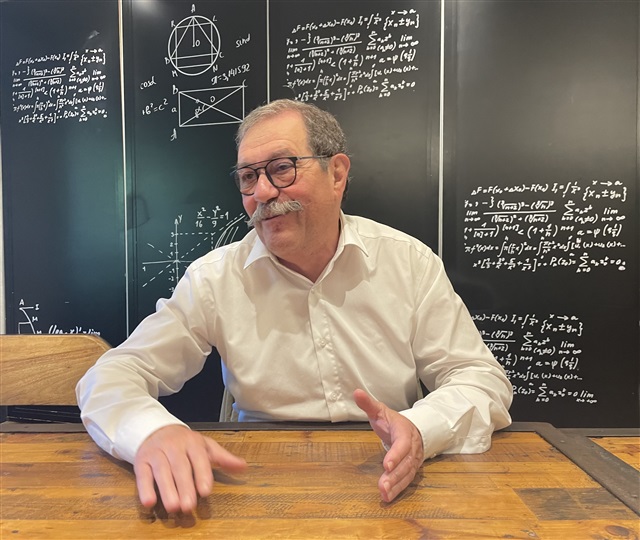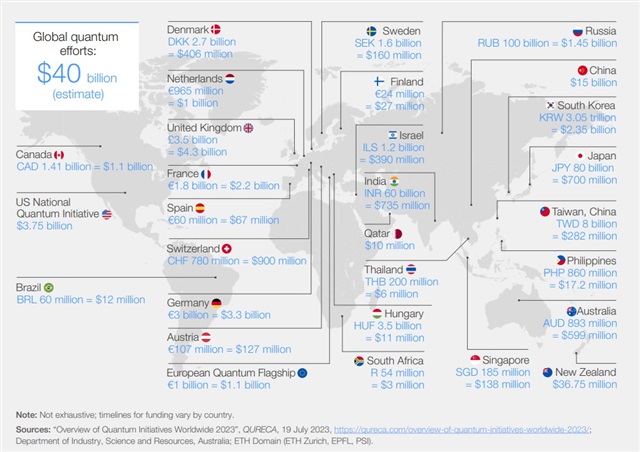In the bustling tech hub of Taiwan, where semiconductor giants and cutting-edge manufacturers dominate the landscape, a different kind of computing revolution is slowly taking shape. Quantum computing, long heralded as the next frontier in information processing, is generating buzz and investment. But according to Alain Aspect, co-recipient of the 2022 Nobel Prize in Physics, quantum revolution in the industry may still be years away from realization.
During a recent visit to the island nation, Aspect, renowned for his groundbreaking work on quantum entanglement, shared his insights on the state of quantum technology and its potential applications. His message was one of cautious optimism, tempered by the realities of technological development and the complexities of quantum systems.

Credit: DIGITIMES
The Long Road to Quantum Impact
Recent market projections underscore the long-term potential of quantum technologies, with the quantum computing market alone expected to exceed US$100 billion by 2050. By 2029, quantum computing hardware is anticipated to reach US$438 million, signaling robust growth in the sector.

.
"Quantum technology is still at the stage of development when we don't know yet what will be the impact on an industry." However, Aspect's perspective is grounded in the current realities of the field. "For the time being, the applications are niche applications developed either by universities or by startups," he explained. "It's not yet a large market."
The French physicist sees startups as the crucial bridge between basic research and large-scale industrial adoption. "It's probably not a direct collaboration between basic research and industry," Aspect noted. "It's more when you have people in basic research who are interested in developing applications, then they create startups."
Scaling Up: The Quantum Challenge
One of the primary hurdles facing the quantum computing sector is the issue of scalability. Moving from laboratory demonstrations to practical, large-scale quantum computers is a formidable challenge. "The question is, is it possible to solve the problem by purely technological means? I tend to think so if there is enough interest and enough money injected." he said.

Credit: AFP
This challenge is evident in the current landscape of quantum computing research. Companies like Google, IBM, and Intel are heavily investing in different types of qubits, such as superconducting qubits and spin qubits. Their goal is to develop fault-tolerant quantum computers capable of outperforming classical systems in specific tasks within the next decade.
Aspect highlighted the progress made by Pasqal, a French company he co-founded, which recently managed to manipulate 1,000 neutral atoms in a lattice—a significant step toward scaling quantum computing. However, he reiterated that sufficient investment and engineering expertise are essential to advancing these technologies.
The Quantum Programming Paradigm
Beyond the hardware challenges, Aspect highlighted another crucial aspect of quantum computing development: programming. "We need a lot of high-level applied mathematicians to develop the mathematical tools to use a quantum computer," he explained. "Because a quantum computer does not resemble at all classical computers. So the method of programming of classical computers does not work."
This need for new programming paradigms and algorithms represents both a challenge and an opportunity. It opens up a new field of research and development, potentially leading to novel approaches to problem-solving that could have impacts beyond quantum computing itself.
Energy Efficiency: A Quantum Advantage?
One area where quantum computers might offer a significant advantage over classical systems is energy efficiency. Contrary to the energy-hungry supercomputers of today, some quantum computing approaches could be surprisingly frugal in their power consumption.
Aspect cited the work of Antoine Browaeys, a researcher at the Institute of Optics, as an example. "The machine of Antoine Browaeys, basically you can work it by just plugging on the wall," he said. "There is good reason to think that a quantum computer will be much less demanding in energy than a big mainframe computer."

Credit: AFP
However, he was quick to add a note of caution: "Now it's not yet demonstrated, because the machine does not take much energy, but the rate of calculation is quite slow." The potential energy efficiency must be balanced against computational speed and problem-solving capability.
This potential for energy efficiency could be a game-changer in an era where sustainable computing is increasingly important. As companies prioritize sustainable energy consumption, the promise of quantum computers solving complex problems with lower energy costs becomes even more appealing.
Quantum Advantage: Solving the Unsolvable
Despite the challenges, Aspect sees great promise in quantum computing's ability to tackle problems that are intractable for classical computers. He pointed to optimization problems, such as the traveling salesman problem, as examples where quantum computers could shine.
"These kinds of problems are problems which are called difficult by the mathematicians, and it's clear that you find immediately the limit of classical computers with that," Aspect explained. "There is a good hope that the quantum computer can solve it directly."
However, Aspect also cautioned against overhyping quantum advantages. "When you speak of a quantum advantage, you have to be careful," he warned. "When somebody announces, oh, I have a quantum advantage on this calculation, ask yourself the question, do they resolve a problem that existed before, or is it just an ad hoc problem? It's not the same."
The Quantum Talent Crunch
As the field of quantum computing advances, Aspect sees a looming challenge: a shortage of qualified professionals. "We will need quantum engineers, and we will not have enough quantum engineers," he warned. "Talent is really a question... many engineers do not have at all or not much quantum education."
To address this, Aspect advocates for increased investment in quantum education and international collaboration. He highlighted a program being developed between France and Taiwan as an example. "We are preparing [a program] between France and Taiwan for having students from Taiwan coming to France, but not for an internship of three months, coming for a full PhD, in labs like mine and things like that."

Credit: DIGITIMES
He urged big companies to play a role in this educational effort. "My advice to big companies is have a small department of quantum computing just to follow and subsidize education," Aspect said. This advice extends to major Taiwanese corporations like Foxconn, suggesting they consider maintaining small quantum computing departments and funding educational programs to build their own talent pipeline.
Quantum Communication: The Next Frontier
While much attention is focused on quantum computing, Aspect also highlighted the progress and potential of quantum communication, particularly in the realm of cryptography. "Quantum cryptography really works," he stated. "But also difficult to scale up."
He pointed to demonstrations of quantum communication over existing fiber optic networks as evidence of progress. However, he identified quantum memory as a key challenge for long-distance quantum communication. "We have some quantum memories, we have some demonstrations, but we do not have a good quantum memory," Aspect explained.
This challenge represents another area where breakthroughs could have significant impacts, potentially revolutionizing secure communication over long distances. The importance of this field is underscored by ongoing global initiatives. For instance, the European Quantum Communication Infrastructure aims to create a secure network across EU member states, while China anticipates that more than 10 major cities will have completed the deployment of quantum metropolitan networks by the end of this year.
Public sector investments in quantum technologies worldwide

Credit: World Economic Forum
The Global Quantum Race
The development of quantum technologies has become a global priority, with significant investments from both public and private sectors. Quantum initiatives worldwide are growing, with investments exceeding US$40 billion. China leads with substantial government funding, while private sector investments in the US are crucial for advancing research and development.
International collaborations are also playing a key role in advancing quantum technologies. Initiatives like the AUKUS agreement among Australia, the UK, and the US aim to enhance their technological capabilities in this domain, highlighting the strategic importance of quantum technologies on the global stage.
The Quantum Future: Everywhere and Nowhere
Aspect envisions a future where quantum technologies are ubiquitous, even if full-scale quantum computers are not yet realized. "Even if there is no perfect quantum computer, there will be quantum everywhere. Small devices, niche applications, that you are going to have stuff like that everywhere," he predicted. This perspective suggests that the impact of quantum technologies may be felt incrementally, across various sectors, rather than in a sudden, dramatic shift.
Aspect also sees a "healthy competition" emerging between classical and quantum computing, benefiting innovation in both fields. "In general, all these ideas about quantum computing force people in classical computing to be smarter," he said.
As the global race for quantum supremacy continues, Alain Aspect's measured outlook serves as a reminder that the path to practical quantum technologies is likely to be long and winding. While the potential of quantum computing and communication is immense, realizing that potential will require sustained investment, patience, and a commitment to education and basic research. The quantum revolution may not arrive overnight, but its impact, when it comes, promises to be profound.


